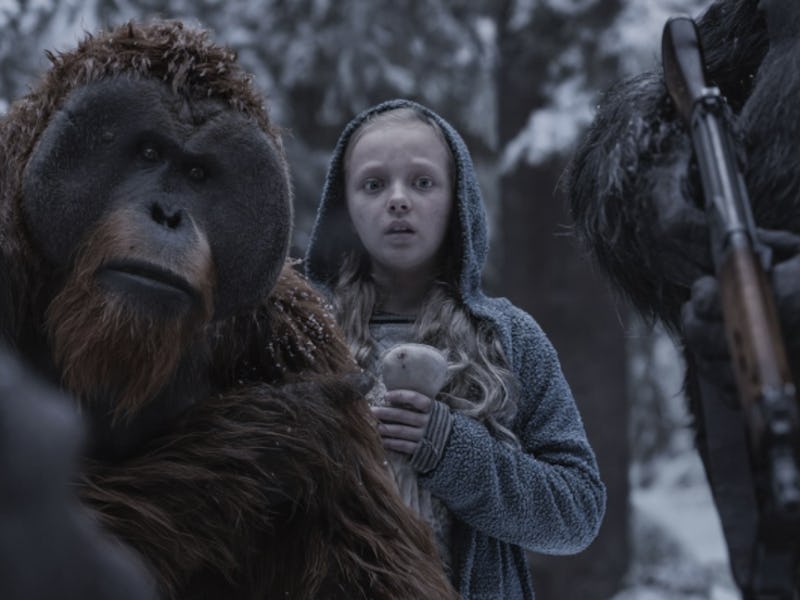In the recently released War for the Planet of the Apes, a brutal army of humans follow a colonel who’s convinced that the rise of intelligent apes is nature’s way of punishing man. He considers it a catastrophe — not just because the outbreak of the artificially created simian flu turned into a pandemic, leaving swaths of humans dead and kickstarting ape super-intelligence. The greater disaster is an unexpected repercussion of the virus, which calls into question one of the defining characteristics of humankind.
Spoilers below for War for the Planet of the Apes.
The villainous Colonel, played by Woody Harrelson, reveals that the mutated virus caused some humans to lose the ability to speak. This, he says, robbed those people “of what makes us human,” turning them instead into “beasts” with a “primitive gaze.” With humans unable to speak — and apes suddenly communicative — the Colonel concludes that humans who cannot speak are no longer representative of the greatest apes.
Evolutionary biologist and cognitive scientist W. Tecumseh Fitch, Ph.D., could not disagree more.
“The villain is wrong,” Fitch tells Inverse. “Signers are perfectly normal humans, and obviously not primitive or regressive in any way.”
At the University of Vienna, Fitch has extensively studied why humans — and not monkeys — are capable of speech. In a landmark study published in December 2016, he and his co-authors argued that what limits nonhuman primates from making human speech sounds isn’t their vocal anatomy, like scientists previously asserted. Rather, it’s the fact that they don’t have the necessary neural wiring to do so. That’s actually why Fitch thinks the Planet of the Apes series gets talking apes right. In his view, the apes’ ability to make speech sounds would only be possible after an artificial brain boost.
“I thought the moment when Caesar [the lead ape] first spoke, obviously with great mental effort, got it just right,” says Fitch. “That’s because the thing keeping chimps from producing speech sounds is not their anatomy, but rather their neural control over the vocal apparatus. So at least the first movie was on the money.”
We have reason to believe that the Colonel’s take on humans without language is wrong. The audience can see from the behavior of the mute, human character Nova that she’s a compassionate, intelligent person. Regardless, Colonel’s belief that the ability to speak is what “makes us human,” and Fitch’s assertion that sign language is obviously a full human language despite being non-verbal, brings up decades of debate over why only humans are capable of speech, and how that puts us at an evolutionary advantage.
Scientists believe that human spoken language developed between 100,000 and 50,000 years ago and is what made Homo sapiens the world’s dominant species. Exactly how it originated, however, is still not known, although there are competing theories about why it emerged. A leading theory posits that there was an genetic mutation that affected the brain, spurring the jump from making basic sounds to using language. One explanation for why it evolved suggests that it was a way to share crucial information and build social networks — in other words, to gossip — and that it materialized concurrently with tool-making.
While scientists don’t exactly know why language emerged, they do understand how it sets humans apart from animals. This comes down to the fact that all languages, including sign language, involve the organizing and combining of sounds or signs in specific arrangements. Humans are the only animals that communicate “compositionally,” using subjects, verbs, and nouns. That ability adds a distinct meaning to communication, allowing humans to conceptualize, crucially, the future and past. In his book Sapiens: A Brief History of Humankind, historian Yuval Noah Harari explains how this led to two essential abilities — to teach and to plan:
A green monkey can yell to its comrades, ‘Careful! A lion!” But a modern human can tell her friends that this morning, near the bend in the river, she saw a lion tracking a herd of bison. She then can describe the exact location, including the different paths leading to the area …. As far as we know, only Sapiens can talk about entire kinds of entities that they have never seen, touched, or smelled.
These capabilities are not unique to spoken langue. Sign language communicates the same depth of knowledge as spoken language, rendering the Colonel’s argument that people who cannot speak are less human both meaningless and insulting. In fact, Gaullaudet University cognitive neuroscientist Laura-Ann Petito, Ph.D., discovered in 1991 that deaf babies begin “babbling” with purposeful motions at the age of 10 months — the same time when hearing children begin to string sounds into words. These motions were systematic, deliberate, and an effective means of communication.
It matters less, it seems, that human beings can make sounds — and much more that they’re able to use language to describe and build the world around them. Whether apes that can do the same threaten our dominance over the animal kingdom, however, remains up for endless debate.
